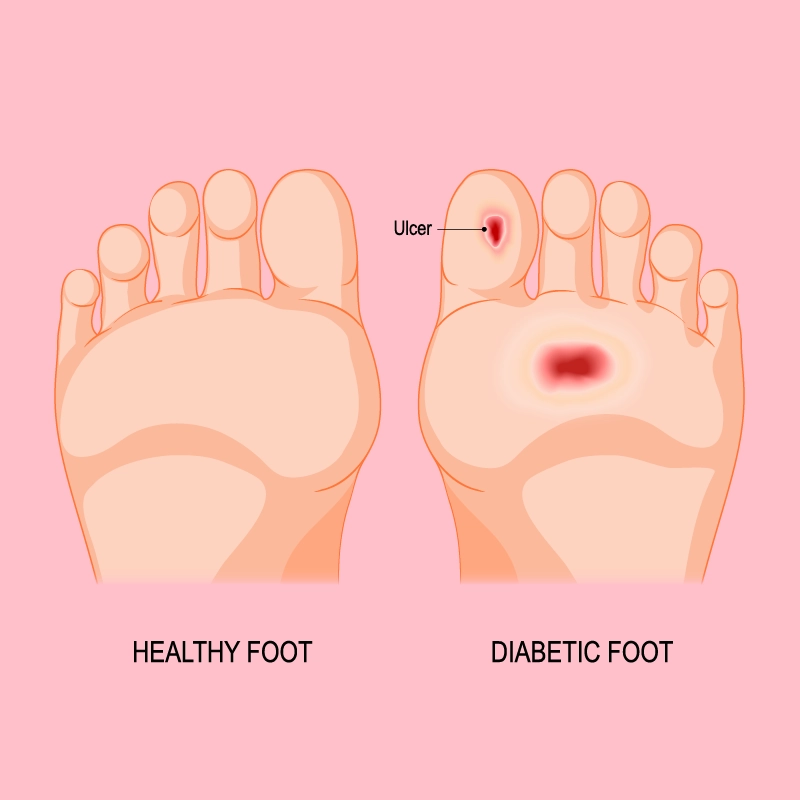
Diabetes is a chronic disease that affects the body's ability to process glucose, leading to high blood sugar levels. Over time, high blood sugar levels can damage nerves and blood vessels, leading to a range of complications, including gangrene.
Gangrene is a condition where the tissue dies due to a lack of blood supply, and it can occur in any part of the body. In this blog post, we will explore the link between diabetes and gangrene and discuss the causes, symptoms, and treatment options for this serious condition.
Causes of Gangrene in Diabetes
People with diabetes are at a higher risk of developing gangrene due to a number of factors. One of the main causes of foot gangrene is peripheral artery disease, which occurs when the blood vessels in the legs and feet become narrowed or blocked. This reduces blood flow to the affected area, which can lead to tissue death and gangrene.
Another factor that increases the risk of gangrene in diabetes is neuropathy or nerve damage. When nerves are damaged, people with diabetes may not feel pain or other symptoms in their feet or legs, even when tissue damage is occurring. This means that they may not seek medical attention until it is too late, and the damage has become irreversible.
Symptoms of Gangrene in Diabetes
Gangrene can occur in any part of the body, but it most commonly affects the feet and legs in people with diabetes. Symptoms of gangrene can include:
- Numbness or tingling in the affected area
- Pain, especially when walking or standing
- Skin that is discolored, dry, or cracking
- Blisters or sores that do not heal
- Foul-smelling discharge from the affected area
- Black or purple discoloration of the skin
- Fever or chills in more advanced cases
Treatment for Gangrene in Diabetes
Diabetic foot gangrene treatment in people with diabetes is a multi-step process that involves addressing the underlying causes of the condition. The following treatments may be recommended by a
healthcare professional:
1. Wound care: The first step in treating gangrene is to clean and dress the affected area. This may involve removing any dead tissue and using antibiotics to prevent infection.
2. Hyperbaric oxygen therapy: This treatment involves breathing pure oxygen in a pressurized chamber. The increased oxygen levels in the blood can help to promote healing and reduce the risk of infection.
3. Medications: Medications may be prescribed to improve blood flow and prevent clotting, which can help to prevent the development of gangrene. Examples of these medications include anticoagulants and antiplatelet drugs.
4. Surgery: In some cases, surgery may be necessary to remove dead tissue and improve blood flow to the affected area. This may involve amputating a toe, foot, or even a leg.
5. Lifestyle changes: Making lifestyle changes such as quitting smoking, maintaining a healthy weight, and exercising regularly can help to prevent gangrene from developing or worsening in people with
diabetes.
Preventing Gangrene in Diabetes
The best way to prevent gangrene in diabetes is to take steps to manage the condition and reduce the risk of complications. This can include:
- Managing blood sugar levels through diet, exercise, and medication
- Quitting smoking, as smoking can increase the risk of peripheral artery disease
- Checking feet and legs regularly for signs of damage or injury
- Wearing comfortable shoes and avoiding tight socks or stockings
- Keeping feet clean and dry, and avoiding walking barefoot
- Seeking medical attention right away if any symptoms of gangrene or other complications occur
Conclusion
Gangrene is a serious complication of diabetes that can lead to tissue death and the need for surgery or amputation. However, with proper management and care, it is possible to reduce the risk of developing gangrene and other complications of diabetes. If you have diabetes, come to Sakra World Hospital which provides you with the best Diabetologist and the best foot surgeon in Bangalore, who works closely with your health to manage your condition, and stays vigilant for any signs of trouble. By taking proactive steps to protect your health, you can reduce the risk of complications and enjoy a better quality of life.

